Archives: Blog
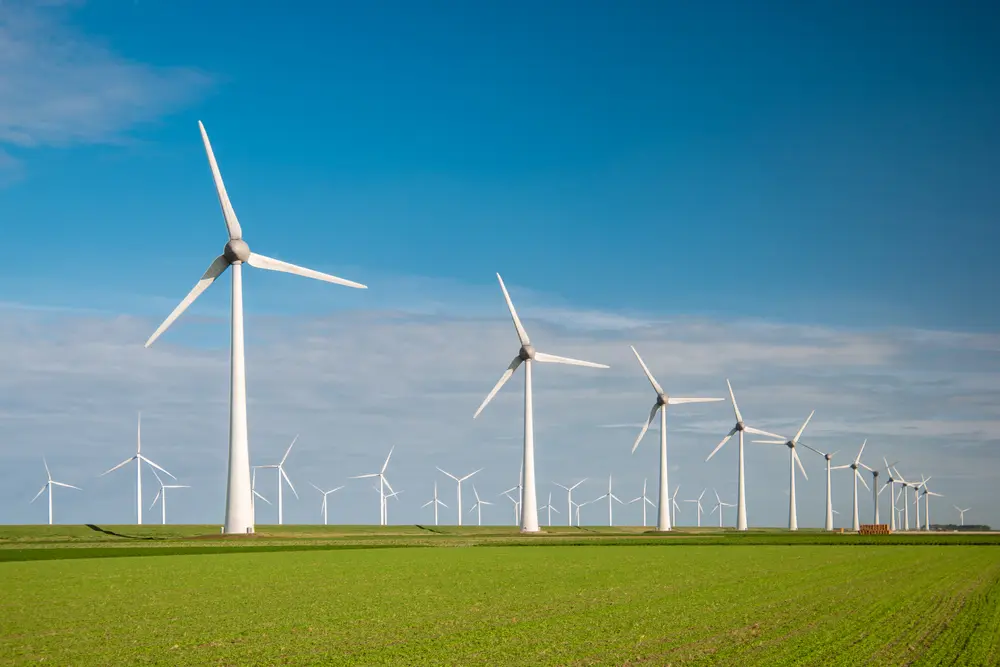
Wind turbine transport: a comprehensive guide
With the need for renewable energy sources growing, the number of wind turbines is increasing every year.
But have you ever wondered how wind turbines are transported to wind farm sites?
Keep reading as we break down everything you need to know about wind turbine transportation.
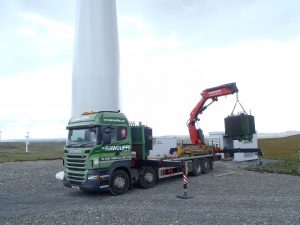
What is a wind turbine?
A wind turbine is an excellent way to convert kinetic energy, in the form of wind, into electricity.
Turbines consist of three blades, which turn in the breeze, and create power using a generator. This is sometimes referred to as wind energy or wind power, and you can often spot them on land or in water.
Wind turbines are hugely popular as they’re a renewable source of energy, offering a more eco-friendly alternative to fossil fuels.
How do you transport a wind turbine to a wind farm site?
Wind turbines are often produced abroad and therefore require meticulously planned haulage.
On the road, they’re classified as heavy haulage, more specifically, abnormal load haulage.
What is abnormal haulage?
An abnormal load is often more than 2.9m wide or weighs more than 44,000kg. It also typically can’t be broken down into smaller pieces, or 2 or more loads without causing damage.
Wind turbines are so large and indivisible that they might not be able to fit on certain narrow roads or low bridges. Moving such huge machinery calls for careful planning, and you may even need to contact the authorities to ensure safety. It’s also essential that you comply with government rules and regulations.
Because of these unique factors, they can’t be transported using normal vehicles. This requires professional haulage fleets, specialised equipment, and experts.

How much does it cost?
Transporting such complicated freight can vary greatly in costs. Factors like distance, destination, the number of vehicles needed, the company you use, and what’s being transported can all affect the cost of haulage services.
Every project is different, so if you need a personalised quote, you can get in touch with the experts.
How big are turbine components?
Turbine components can massively differ in size, with wind turbine blades ranging anywhere from 0.5 to 15 metres long.
The average height of wind turbines and their separate components, like blades, is also increasing, which is projected to continue due to larger turbines generating much more energy. Because of this, size often varies on a case-by-case basis.
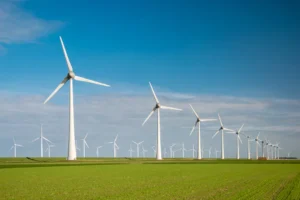
Why choose JB Rawcliffe when transporting wind turbines?
Here at JB Rawcliffe, we’re specialists in haulage services. Over the past 45 years, our projects have supported a range of industries including the construction, defence, marine, industrial, shipping, oil, and gas sectors.
We’re also proficient in a range of services across the UK, including abnormal load transport, heavy goods storage, machinery and cargo handling, and vehicle accident salvage and recovery.
Route planning when transporting such complex freight can be a minefield, which is why our team will take the reins on your project’s logistics, meticulously planning and fine-tuning every detail for you.
So, if you’re in need of friendly and professional haulage services from a knowledgeable team, get in touch with us today.
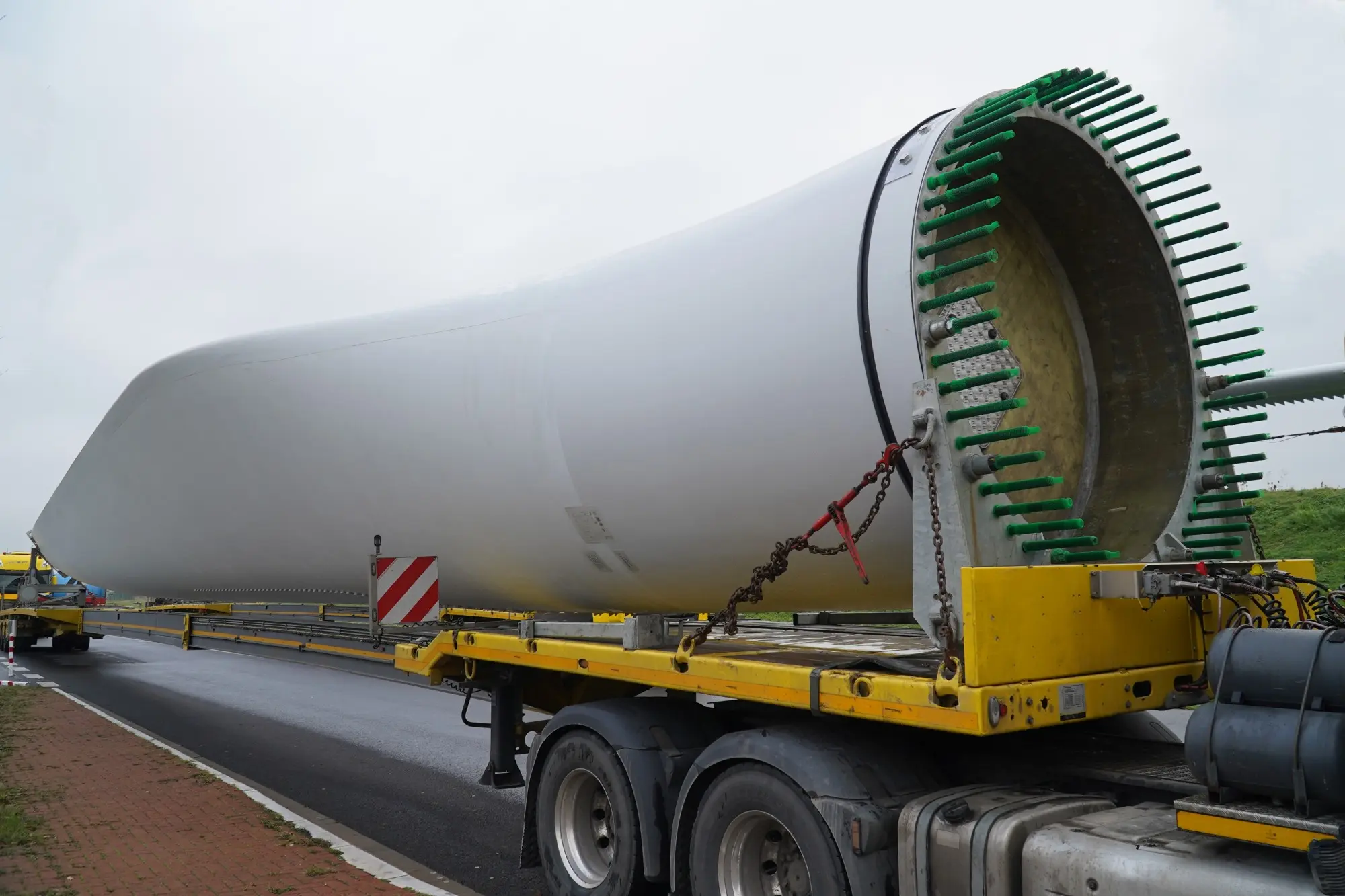
How much does it cost to transport an abnormal load?
If you need to transport heavy or indivisible goods, it might be difficult to even know where to start.
From navigating regulations from the highway authorities to the physical transportation itself, JB Rawcliffe is a heavy haulage company that can guide you through every step.
Read on to learn more about abnormal loads, their costs and factors that may affect this.
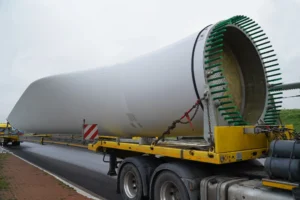
What is an abnormal load?
In the UK, dimensions that categorise abnormal haulage are set out in the Construction & Use and Authorised Weight regulations.
An abnormal load refers to any heavy load that weighs over 44000 kg (or 43.3 tonnes), has an axle load of 10,000 kg for a single non-driving axle, or 11,500 kg for a single driving axle.
It can also include any goods that are over 2.9 metres wide or have a rigid length of over 18.65 metres (61 feet).
Due to these large dimensions, an abnormal load is typically unsafe to be carried by a standard goods vehicle and requires specialist transportation.
Examples of abnormal loads can include “abnormal indivisible loads”, which refer to large goods that can’t be divided and separated, such as trains, motorhomes, or huge pieces of industrial equipment.
When moving abnormal loads, the road and bridge authorities must be notified and sometimes even the police. Many abnormal loads therefore require specialist trailers, or other forms of specialist equipment, for a successful transit.
Because of this, opting to work with a reliable and trustworthy private escort vehicle service can ensure that you have a hassle-free haulage experience.
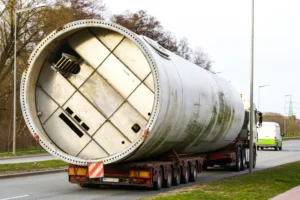
How much is an abnormal load transport?
The cost of abnormal load transportation can vary on a case-by-case basis.
Due to the added dangers and complexities that come with abnormal load transports, prices can be more expensive than regular haulage services.
Typically in the UK, no two haulage companies or projects are the same.
Deciding factors typically include:
- The type of haulage (including size and weight)
- The length and complexity of the journey
At JB Rawcliffe, we offer abnormal load haulage at competitive rates without compromising on service.
For a tailored quote specific to your project’s requirements, you can contact us today!
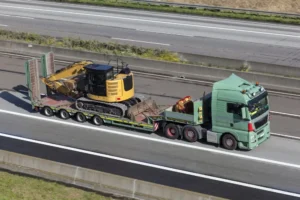
Why choose JB Rawcliffe?
Here at JB Rawcliffe, we have over 45 years of experience in professionally transporting goods throughout the UK. Today, we’re a leading heavy haulage service.
We offer a bespoke service, which means that our solutions are tailored to the requirements of our clients, so whatever goods you require to be transported, we’re here to help.
Our extensive list of accreditations and gleaming reviews speak for themselves. We’re renowned for our positive attitudes, stellar communication and competency towards each one of our abnormal load transport projects.
When you choose JB Rawcliffe, you can focus on your project and minimise hassle while we organise the entire haulage process for you.
Get in touch
Ready to discover outstanding abnormal load movements for your next project? Get in touch with one of our friendly experts today for more information or a quote.
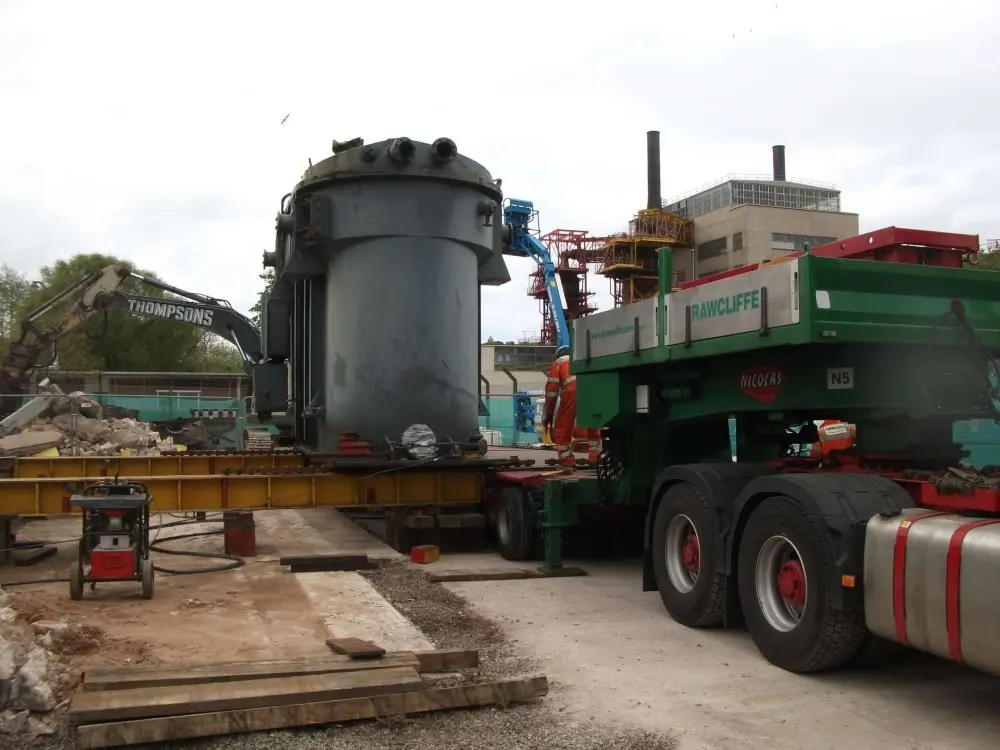
What is jacking and skidding and when should it be used?
Transporting and handling large, heavy objects in smaller spaces requires specialist equipment. Usually, cranes or self-propelled modular transporters (SPMT) are chosen for manoeuvring abnormal loads and heavy goods, but even they cannot be used at times.
When space is limited, jacking and skidding are the go-to options for many heavy haulage companies. But, what are jacking and skidding and how are they used?
Continue reading this insightful guide to find out.
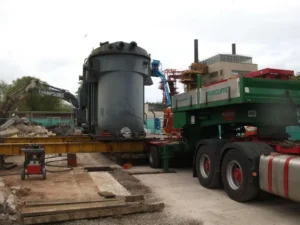
What is jacking and skidding?
Jacking and skidding is a technique used to move heavy goods when there is not enough space for a crane or SPMT.
There are several different types of jacks available to use. Three of which are: climbing, cylinder and strand.
Climbing jacks are hydraulically powered and can raise and lower heavy loads.
Cylinder jacks lift loads to a position where climbing jacks can be placed underneath and transport the goods. Once the climbing jack is out of the way, they can also lower the object to ground level.
Strand jacks contain a hydraulic cylinder which moves a cable through the jack and allows the load to be lifted or lowered.
Skidding systems are also powered by hydraulics and enable precise positioning across a range of different industrial projects. They’re made of two main parts: skid shoes and skid beams.
Both the skid shoes and the load travel along the skid beams using a self-locking hydraulic propulsion system.
What are the benefits of using a strand jack system?
Due to being automatic solutions, strand jacks can lift and lower without any personnel at the jacks whilst also possessing pre-set overload protection.
Strand jacks also provide remote control monitoring and mechanical fail-safe gripping mechanisms, if required. They can be adjusted at various speeds, to, automatically synchronising irrespective of loads.
Additionally, strand jacks can hold their load mechanically rather than hydraulically when movement is stopped. A counterbalance valve ensures smooth and controlled lowering.
Another benefit strand jacks offer is their lifting capacity with some models capable of lifting up to 1405 tons.
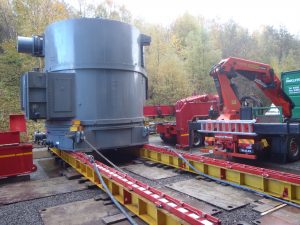
When and how is jacking used?
Jacking systems are used in the heavy haulage industry when there are restrictions to access or cranes cannot be used.
When access is restricted or a crane cannot be used, abnormal loads can be lifted and loaded by a jacking system.
Different types of jacking systems can be used depending on the load. For example, strand jacks are used for a suspended load or to position it over a skid track for horizontal movement. Hydraulic and mechanical jacking systems are used to elevate a load, and there must be a strong and stable foundation when lifting vertically.
Hydraulic and mechanical jacks can be used with skidding systems. For example, the load is jacked up and then moved horizontally to its new position with a skidding system. These operations are effective for lifting and moving loads within buildings or for installations at a site with restricted space.
Strand jacks are flexible, allowing for different types of configurations. They can be used as a single device or with multiple devices, making them suitable for both onshore and offshore operations in a range of industries.
Because the clamps in a strand jack have a crushing effect, they have a limited number of lifting operations but the length of the strands can vary depending on the lifting requirements for each task.
When and how is skidding used?
Skidding systems are capable of moving all kinds of different loads, ranging from one ton to over 1000. Cranes are not always the best – or safest – option for horizontal load movement, so skidding systems are often favoured, especially if space is limited.
Hydraulic skidding systems tend to have the same essential components: tracks, skid shoes and hydraulic cylinders.
Skidding systems are used to horizontally transport abnormal loads that would otherwise be very dangerous to lift with a crane. Moving them slowly and carefully along skid tracks makes it safe for everybody in the surrounding area, and ensures the goods remain undamaged.
A jacking system would lift the goods onto the skidding system, where they would then be taken to their destination. Skidding systems can only transport goods in a straight line, so if turns are required, the goods would need to be lifted and placed on another track.
Skidding systems have been in regular use since the 1980s and remain one of the safest ways to transport huge objects. They’re not just for heavy objects, though.
Skidding systems are often used in small spaces and are useful for transporting goods down a hallway, for example. Specialised rigs can be used to move power transformers down the hallways of hospitals or office buildings.
Choose JB Rawcliffe & Sons for jacking and skidding
Do you require the expert services of a heavy haulage company that can move your goods using jacking and skidding systems?
If so, you’re in the right place! At JB Rawcliffe & Sons, we have decades of experience in this industry and know the exact type of equipment required for every job.
Simply contact us today and we can talk about your requirements. Call 01695 737 880 or send an email to enquiries@jbrawcliffe.com to speak to a member of our team.
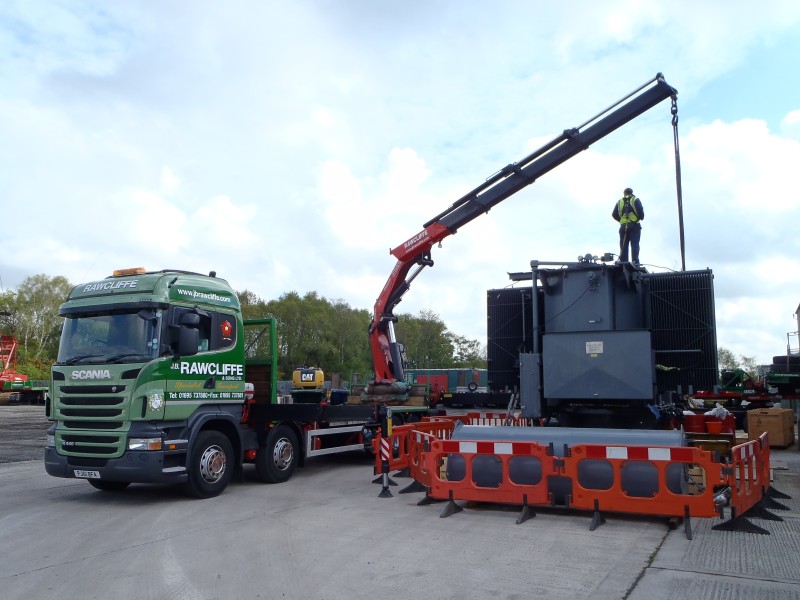
What can a HIAB crane lift?
If you’re a business that regularly requires the transportation of heavy goods, a HIAB crane can be useful.
These powerful machines can perform a variety of lifting and transportation tasks and are used around the UK daily by thousands of businesses.
Interested in using a HIAB crane but unsure of what they can lift? Continue reading to find out everything!
What is a HIAB crane?
HIAB (Hydrauliska Industri AB) is a Swedish brand name that’s synonymous with crane-mounted lorries because of their reliable quality since their creation in 1944.
A HIAB crane is a crane-mounted truck that can both lift and transport heavy objects using their bed, making them a useful piece of equipment for businesses of all sizes and sectors.
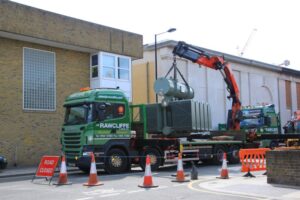
What can you lift with a HIAB crane?
HIAB cranes allow businesses to lift and transport a huge range of materials and objects. Whatever sector you specialise in, you can benefit from a HIAB crane.
Here’s what you can lift with a HIAB crane, from industry to industry.
Industrial equipment
- HVAC units – Heating, ventilation and air conditioning units are heavy and require precise placements.
- Generators and transformers – Heavy pieces of equipment can be safely lifted, strapped down and transported.
- Machinery parts – Large machines have individual components that require specialised lifting and transportation.
Construction materials
- Concrete blocks and slabs – Concrete elements that are used in foundations and walls can be difficult to transport without a HIAB crane.
- Bricks and roofing materials – Pallets of tiles, bricks and other building materials can easily be lifted and transported – safely – with a HIAB crane.
- Roof trusses – Critical roofing components are large and cumbersome, but a HIAB crane can safely transport them on their beds, as well as unload them at the destination.
- Steel beams – A HIAB crane can easily lift, transport and place steel beams in a precise location.
Landscaping and agriculture
- Farm equipment – HIAB cranes have the power to lift tractors and farming machinery and then deliver them somewhere else for maintenance, for example.
- Soil and fertiliser – Huge quantities of soil, fertiliser and compost can be efficiently transported via a HIAB crane.
- Trees and plants – Moving huge trees and large plants improves the efficiency of a landscaping task with a HIAB crane.
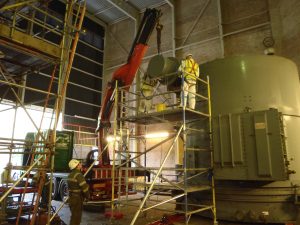
Shipping and logistics
- Pallets – Pallets packed full of a variety of goods, whether it’s furniture, electronics, or raw materials, can be handled with ease by a HIAB crane.
- Bulk items – Timber, scrap metal and other heavy materials can easily be lifted and transported on the back of a HIAB crane.
- Shipping containers – Shipping containers – even filled with goods – can be lifted and transported on a HIAB crane, improving the logistics and transportation for this sector.
- Cabins – Portable cabins can be transported to construction sites and other locations with a HIAB crane.
What are the benefits of a HIAB crane?
As we’re sure you can imagine based on the amount of objects a HIAB crane can comfortably handle, there are several benefits to using one.
A HIAB crane offers businesses of all sizes an efficient way to transport their large and heavy items with a vehicle that combines loading and unloading with transportation.
Precision
A HIAB crane features a powerful hydraulic system that allows for precise control and ensures that all items are lifted and placed exactly where they’re intended.
When hiring a heavy haulage company to transport your goods, you’ll be keen on ensuring precision is an essential focus. With a HIAB crane, you’ll be pleased to know your goods will be lifted carefully and placed exactly where you need them.
Mobility
The key benefit of a HIAB crane is its ability to transport the items it lifts. In the haulage industry, many pieces of equipment are loaded onto a large lorry with another piece of equipment, like a forklift truck. The goods are then transported to another location and are only unloaded with another piece of machinery.
With a HIAB crane, everything is combined. The goods can be lifted, transported and unloaded by the HIAB crane.
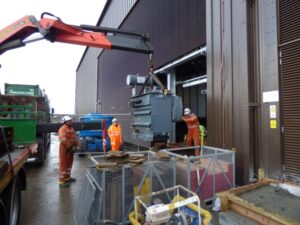
Efficiency
Cutting out other pieces of machinery and equipment that are otherwise required for loading and unloading, a HIAB crane provides efficiency and speed.
Easily load, transport and unload on-site with a single piece of machinery, improving the productivity of the entire process.
Versatility
A HIAB crane can lift an enormous range of objects from a variety of different industries. Whatever sector your company specialises in, you’ll benefit from a HIAB crane.
HIAB cranes can lift almost anything from pallets of bricks or sand to portable cabins and heavy-duty shipping containers.
HIAB crane hire at JB Rawcliffe & Sons
If you require the services of a reliable and professional heavy haulage company to transport your heavy goods, you can benefit from expert HIAB crane hire services from JB Rawcliffe & Sons.
We can provide fantastic HIAB crane hire for clients all over the UK thanks to our extensive fleet with lifting capabilities to suit every task. Whatever your goods, we’ll ensure we can meet your requirements.
Interested in our HIAB crane services? If so, contact us today by calling 01695 737 880 or by sending an email to enquiries@jbrawcliffe.com.
A member of our team will be happy to discuss your haulage needs and go through our HIAB crane hire options.
